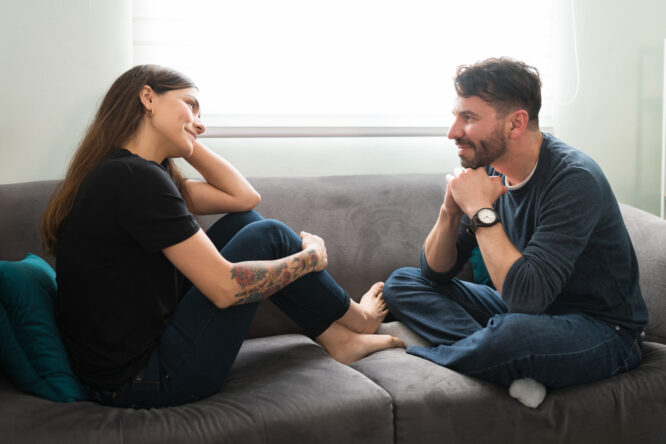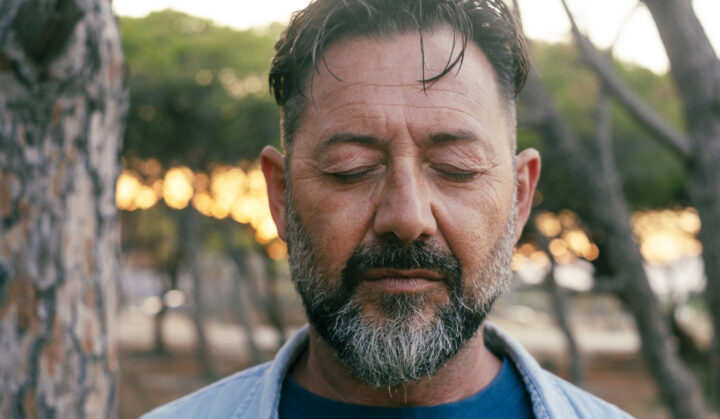Love should feel like growth, not disappearance.

However, sometimes without meaning to, we shrink ourselves inside a relationship just to keep the peace, hold onto connection, or meet expectations that never really felt like ours. When your sense of identity starts to blur and your needs always come last, it’s not just compromise anymore—it’s self-abandonment. If these signs feel familiar, it might be time to check in with the version of you that’s been fading in the background.
1. You don’t know what you like anymore.

Your preferences used to be clear—what made you laugh, what music you loved, how you spent your free time. Now, you hesitate when someone asks what you want because you’re not even sure anymore. Everything has slowly shifted to fit around someone else’s world. It doesn’t happen all at once. It’s usually small compromises that pile up until your identity starts to feel fuzzy. You’re not just sharing a life; you’re disappearing into someone else’s.
2. You check how they’ll feel before you check how you feel.

Before you make a decision, voice an opinion, or even say how your day went, your brain runs a filter: how will they take this? You edit yourself to avoid tension, soften the truth, or make them more comfortable. That instinct can feel like care, but it’s often fear disguised as love. Eventually, you stop showing up as your full self and start managing their emotions instead of honouring your own.
3. You feel anxious when you’re not with them.

It’s not just missing them—it’s a gnawing sense of disconnection from yourself when they’re not around. You might feel unsure of how to fill your time, or restless without their presence to anchor your day. That kind of anxiety often points to over-reliance, not deep connection. When your emotional rhythm starts depending entirely on one person, it’s easy to lose your footing when they’re not right beside you.
4. Your friendships have faded away.

You used to have people to turn to—friends who knew your history, who saw you outside of your relationship. Now, your social world has shrunk, and even reaching out feels awkward or overdue. That isolation isn’t always intentional. It creeps in when a partner becomes the centre of your emotional world. And while closeness can be beautiful, it shouldn’t come at the cost of community.
5. You apologise for things you didn’t even do.

Every disagreement ends with you saying sorry, even when you’re not sure what you did wrong. You take responsibility to keep the peace, to fix the mood, to make things okay again. However, that constant apologising sends a quiet message to your own brain: I’m the problem. As time goes on, it eats at your confidence and convinces you that your feelings aren’t worth defending.
6. You feel like you’re walking on eggshells all the time.

You carefully choose your words. You hold back feedback. You don’t want to be too much, too needy, too anything that might cause friction. So instead, you shrink. That kind of tension is draining. It teaches you that your authenticity is risky, and your truth needs editing. You become a quieter version of yourself just to avoid setting something off.
7. Your goals have taken a back seat.

That course you wanted to take? That move you considered? Those dreams you had before this relationship? They’ve all been paused or erased because they don’t fit neatly into your current dynamic. Some sacrifice is normal, but disappearing your goals completely isn’t. When someone else’s path becomes the only one that gets followed, your future stops feeling like your own.
8. You second-guess your every move.

What used to feel like simple choices—what to wear, how to spend your evening, who to text—now feels complicated. You worry about how they’ll react, even to things that have nothing to do with them. That constant second-guessing is a sign you no longer trust your own judgement. It’s not just about pleasing them; it’s about slowly forgetting how to just be you, unfiltered and unapologetic.
9. You feel guilty for needing space.

Wanting a weekend alone, a few hours to recharge, or time with people outside the relationship makes you feel like you’re doing something wrong. You worry they’ll take it personally or see it as rejection. Of course, healthy love doesn’t demand 24/7 closeness. When you feel bad for needing air, it often means the relationship has started to swallow the parts of you that need room to breathe.
10. You downplay your stress or struggles.

You pretend you’re fine when you’re not. You minimise your problems, avoid venting, and keep your emotions neat and tidy so they don’t spill over. You don’t want to be the “difficult” one. However, this creates a dynamic where you disappear in your own pain. You start feeling invisible, even while being physically present. Slowly, the person you were before starts fading further out of sight.
11. You hesitate to express excitement about things they don’t care about.

When something excites you—an idea, a hobby, a plan—you hold it back if you think they won’t get it or approve. You stop sharing the parts of you that don’t line up with their interests or values. That hesitation is a warning sign. You shouldn’t have to shrink your joy to make someone else comfortable. When your enthusiasm becomes a private affair, your relationship stops being a safe place for your full self.
12. You’ve become emotionally numb.

You’re not crying, but you’re not laughing much either. You go through the motions, say the right things, and keep things steady, but something inside feels flat. Like you’re living on autopilot. Sadly, emotional numbness isn’t always obvious at first. It creeps in when you stop feeling safe to be honest. After a while, it becomes easier to disconnect than to feel constantly misunderstood or unimportant.
13. You rarely ask yourself what you want.

From dinner choices to big decisions, your default is: what would make them happy? Your own wants have become blurry or buried under layers of compromise. You’ve stopped checking in with yourself altogether. That silence isn’t peace; it’s self-neglect. When your own voice goes quiet in your own life, it’s a sign you’ve been putting yourself on mute for too long.
14. You don’t recognise who you’ve become.

You catch yourself in the mirror or hear yourself talking and think, “When did I become this version of me?” You remember feeling more confident, more expressive, more sure of yourself. Now, it’s all a little distant. Being disconnected from your own identity doesn’t mean you’re broken—it means you’ve been dimming your light to fit into something smaller than you. The good news is that version of you is still in there, waiting to be reconnected with.




